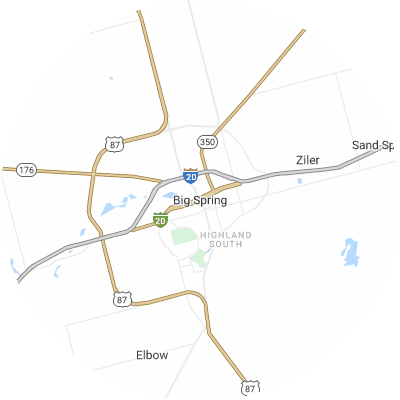Please enter a valid 5-digit zip code!
Written By David Cusick
Last Updated April 2024
A new solar energy system could give you a renewable power source that will eventually pay for itself. Solar power can reduce your energy costs and shrink your carbon footprint. However, it's important to choose a trustworthy solar installer. That’s why we’ve reviewed the options and compiled a guide to the most reputable solar Installers in Big Spring. These top installers offer high-quality and reliable services.
Informative resources
Reliable customer support
Clear pricing policy
Free quotes
Services Offered
Clear pricing policy
Free quotes
Services Offered
Clear pricing policy
Informative resources
Reliable customer support
Services Offered
Today's Homeowner looks at dozens of datapoints on solar companies to come up with our data-driven rankings. It's not possible for a company to pay for preferential treatment in our rankings. We look at the following key factors in determining who should top our list:
Going solar can be a great way to lower electricity costs and help the planet by reducing your carbon footprint using renewable energy. Here are some crucial factors to consider when evaluating if a solar installer is trustworthy.
It's important to hire a licensed solar installer. This ensures that the work is done correctly using current installation best practices. All solar contractors in Texas must have a state electrical contractors' license from the Texas Department of Licensing and Regulation. The Texas State Board of Plumbing Examiners regulates plumbing regulations and licensing standards for solar thermal installers.
Check review sites like Google Reviews, TrustPilot, and the Better Business Bureau (BBB) to see customer feedback about local solar companies. Detailed reviews can help you evaluate a company's reliability and customer service. Use caution with companies that have no reviews or mostly negative ones.
Get free, detailed quotes from three to five solar companies. The quotes should outline all costs and identify the exact solar parts included. Looking at several quotes can help you find the option that best fits your budget.
High-quality solar installations should have robust workmanship and performance guarantees. The workmanship guarantee covers any installation issues like poor wiring, cracks in the panels, or poor alignment. The output warranty guarantees an energy generation baseline. Strong guarantees reflect a solar provider's faith in its installations.
Switching to solar power can help reduce your energy expenses. Be sure to weigh these aspects when determining the cost and value of solar panels.
In Big Spring, solar panels cost an average of $3,330 per kilowatt, with an average system size of 7.0 kilowatts. The typical Big Spring homeowner spends $16,333 on their solar array after federal tax refunds. An estimate from a local provider will take into account additional information reflecting your desired system's capacity, panel type, size, and required preliminary work. In some cases, homeowners may prefer leasing solar panels to reduce upfront costs.
Incentive Amount:
Free Equipment Program: Free appliance installation and weatherization services
Home Improvement (includes attic insulation, duct sealing, duct insulation, duct replacement, high-efficiency gas furnace, and Wi-Fi thermostat: Up to $1000
Solar Water Heater With Natural Gas Backup: $750
Tankless or Super High-efficiency Water Heater: $650
Furnace: $675
Furnace Tune-Up: $40
Natural Gas Dryer with moisture sensor: $225
Natural Gas Dryer Stub: $300
Generally speaking, a solar photovoltaic (PV) system can be used to power any household appliance or system that uses electricity. In the simplest case, you can use a solar water heating system.
There are a number of benefits to home solar energy. You can save money, reduce emissions, and qualify for tax benefits. With the right storage equipment, solar panels can also provide you with additional energy security and offer some protection from power outages.
Yes. The grid in Big Spring already uses a large share of renewable energy sources, and you may be able to sell your excess generated energy to your utility for additional cost savings.
Generally speaking, your energy bills will significantly decrease after you install solar panels. This is because you're using the energy you generate for free rather than buying it from your power company. In Big Spring, the average amount someone can save is $1,669 per year. With net metering programs offered by many utilities, you could ultimately make a profit from your system once the payback period passes.
Your payback period is the time to achieve an ROI on your solar panels. It will vary based on their rated capacity, the average sunlight in your area, and the rate your utility charges per kilowatt of power. Big Spring has extremely high daily sunlight levels, so you could recoup your investment in as little as 9.8 years per 5 kW of rated capacity.
Although solar energy is a great option for many, it might not be ideal for homeowners in wet, dark areas. In these cases, a contractor might recommend other forms of renewable energy, such as wind or geothermal power, as a primary source. It is also important to speak to a qualified installer to determine if their solar system is compatible with the climate and environment of your area. Even if you choose a different form of renewable energy altogether, you'll still lower your emissions and could still qualify for distributed generation or other money-saving programs.
The answer ultimately depends on your specific situation. You can take advantage of a federal tax credit of up to 30% of the system's cost, as well as state or local incentives depending on where you are. As for insurance, you'll need to notify your insurer about your new solar panels. Your premium may increase due to added property values, but you'll have peace of mind if a covered event happens to the system.
The most common types of home solar panels in Big Spring include polycrystalline, monocrystalline and thin-film. Monocrystalline panels are balanced and efficient, while thin-film and polycrystalline panels pair good performance with greater upfront value. Ask your local provider about the types of solar panels they work with.
